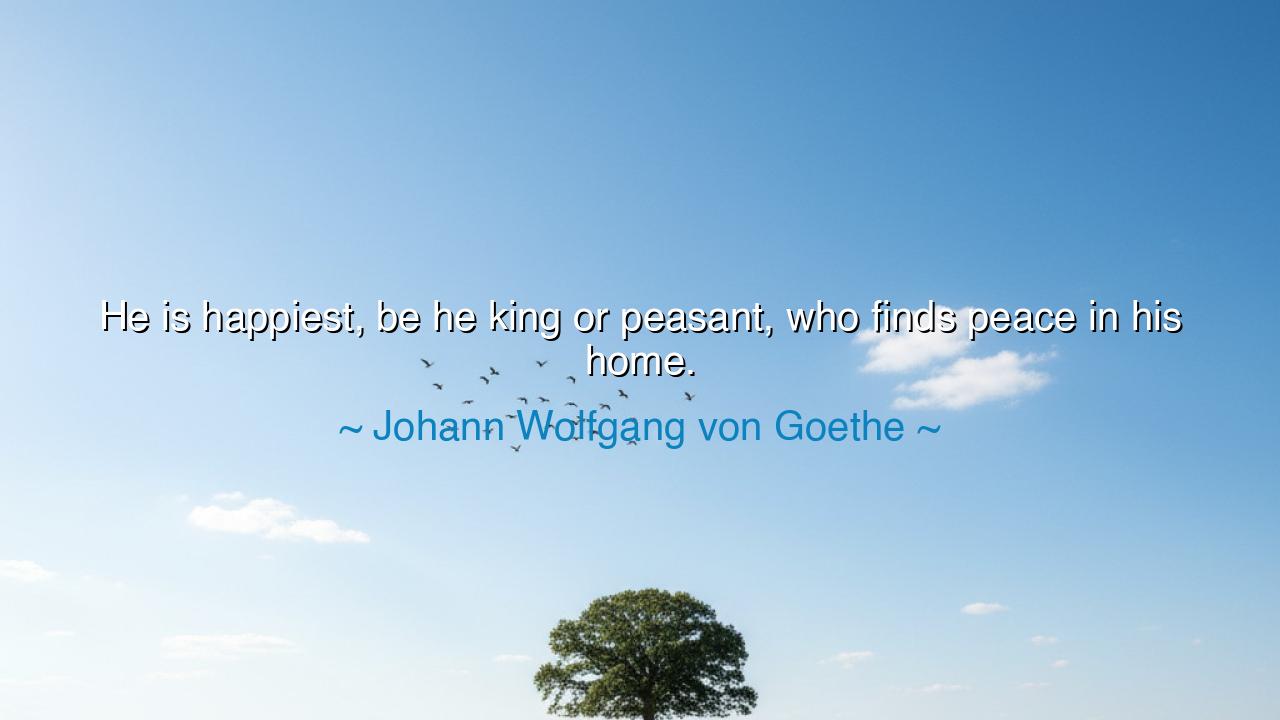
He is happiest, be he king or peasant, who finds peace in his






“He is happiest, be he king or peasant, who finds peace in his home.” Thus spoke Johann Wolfgang von Goethe, the sage of Weimar, poet of the soul and philosopher of life. In this single sentence, Goethe gathers the wisdom of centuries: that all the riches, honors, and glories of the world are as dust compared to the quiet joy of peace at home. For the heart of man is not nourished by gold nor fed by applause—it is fed by belonging, by harmony, by the tender fire of love that burns quietly within one’s own walls.
The origin of these words lies not only in Goethe’s thought but in the life he lived. As a man of letters and influence, he moved among princes and philosophers, yet he often withdrew to the solitude of his home in Weimar, to write, to dream, and to reflect. He saw how kings were restless despite their crowns, and how peasants, though poor, often carried a serenity that palaces could not buy. Thus, he discerned a truth older than empires—that true happiness does not dwell in circumstance, but in inner peace, and that this peace is first kindled within the sanctuary we call home.
To find peace in one’s home is no small thing. It is to conquer the chaos of the world by mastering oneself. A man may roam the earth in search of meaning, yet if his own hearth burns with strife, his soul remains unanchored. But the one who returns home and finds there love, understanding, and stillness, holds the world’s richest treasure. Goethe’s words remind us that the grandest kingdom is not built upon land or wealth, but upon the foundation of contentment. The home, he teaches, is both the cradle and the mirror of the heart.
There is an old story from the East of a mighty emperor who sent his wise men to find the secret of happiness. After many years, they returned with a single phrase written upon a golden tablet: “Peace begins at home.” The emperor, in his pride, thought it too simple and cast it aside. Yet as he grew older and his conquests brought him only sleepless nights, he realized that the tablet had spoken the truth. The peace he had sought in the submission of nations could only be found in the stillness of his own soul—and in the love of those who waited for him behind his palace doors.
Goethe’s wisdom is a lamp that shines even brighter in our restless age. We live in a time when men chase endless ambition, traveling far from their hearths in pursuit of shadows. Yet even as the world grows louder, the ancient longing remains: to come home to a place of rest, to a heart that welcomes without judgment, to a peace unbroken by the storms outside. Whether one dwells in a cottage or a castle, the ache is the same—to dwell in harmony with one’s surroundings and oneself.
The home, in Goethe’s sense, is not merely a building of walls and roofs, but a sanctuary of the spirit. It is where truth must live, where gentleness must be practiced, where forgiveness must take root. For if a man cannot find peace in his own home, he will find it nowhere. But when peace reigns there—when kindness governs speech, and patience tempers anger—then even the humblest house becomes a palace, and its dweller, though poor, becomes a king.
The lesson is this: do not seek happiness in distant lands or in the applause of strangers. Cultivate it where you stand. Tend to the flame of your home—keep it warm with love, uncluttered with bitterness, bright with gratitude. Speak softly there, forgive swiftly there, rest fully there. For it is in that quiet, unseen work that greatness is born. A peaceful home makes a peaceful soul, and a peaceful soul makes a better world.
Thus, as Goethe teaches, whether you wear a crown or a cap, whether you dine on silver or on clay, your truest joy will not come from what lies beyond your door, but from the peace that dwells within it. Build your home, not only of brick and beam, but of compassion and care. Guard it well, for within those walls lies the kingdom of your heart—and he who finds peace there, has found all.






AAdministratorAdministrator
Welcome, honored guests. Please leave a comment, we will respond soon